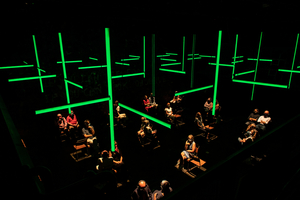Review Roundup: BLINDNESS at the Daryl Roth Theatre
Blindness is one of the first shows to open since the theatre shutdown last year.

Blindness, The Donmar Warehouse production of Nobel Prize-winner José Saramago's dystopian novel written by Tony Award winner Simon Stephens (The Curious Incident of the Dog in the Night-Time) and directed by Walter Meierjohann, is now open at the Daryl Roth Theatre (101 East 15th Street at Union Square East).
Presented by Tony Award-winning producer Daryl Roth, Blindness will mark one of the first performing arts events to open in New York City.
Blindness is a socially distanced sound and light experience. Through spellbinding storytelling narrated by Olivier Award winner Juliet Stevenson, it unveils the gripping story of a world changed forever in the blink of an eye, reminding us that from the darkness, we will all emerge stronger.
Want to learn more about the production? Check out the Stage Mag that audiences get at the theatre.
Let's see what the critics are saying...
Maya Phillips, New York Times: For someone like me, who had just read the novel, "Blindness" is more a sensory experience than a richly theatrical evocation; more than a fable about hope and humanity, it plays as a thrill for long-deprived ears and eyes. By the time I departed the theater, the milky gray ambivalence of the afternoon sky had finally given way to rain, the kind of rain that baptizes the trio of women in the production's last scene. I left thinking not about order and chaos, individuality and community, empathy and selfishness, as I expected I might. I only considered the blunt fact of my vision - the sights of Union Square, its pedestrians and traffic. In other words, the electrifying panorama of the world around me - though I also knew there was so much more to be explored.
Greg Evans, Deadline: Meierjohann's staging - the concept, the tech stuff, the performance - lends a vividness to Saramago's fabulism that the 2008 film, with all its graphic and naturalist detail, lacked. Onscreen, the broad strokes of allegory reduced so many of the imprisoned characters to mouthpieces, each an artificial representation of a human attribute - loyalty here, sadism there, compassion way over yonder. In this production, we receive everything through the voice of the one character who remains sighted, a storyteller gathering us round a virtual campfire to chill us with the unseen horrors breathing down our necks.
Juan A. Ramirez, Theatrely: The particulars of the story are not exactly memorable, though the obvious pandemic parallels inspire equal parts awe and eyerolls. What elevates this production, aside from Stevenson's performance and the brilliant technical craft, is its bravura ending. The narrative finale itself is rushed and, again, don't ask for specifics. But director Walter Meierjohann's masterful inversion of the typical fall of the curtain is one that inspires hope, not just for the beleaguered characters, but for the end of this overlong plague.
Elysa Gardner, New York Stage Review: When relief does arrive, it seems a bit calculated, though beautifully so. It's here that Stephens's own poetry soars highest, so that additional thoughts and observations are unnecessary, as the designers-who also include Lizzie Clachan (scenic)-conspire with the playwright and director to deliver the kind of transcendence only offered by live theater, in a communal setting. In more than one sense, then, Blindness proves well worth the wait.
Roma Torre, New York Stage Review: As directed by Walter Meierjohann, the overall tone is unsettling to the point of being truly frightening, and that's owed in large part to our disorienting times. The combined effect of the dystopian story, the realistic sounds and Stephenson's bravura narration may be a little too close to the bone for some to take these days. But I would add that Saramago's story seems all the more prescient as it ends on a note of hopefulness for his sightless souls... just as we too are emerging from our own pandemic hell.
David Cote, Observer: Jessica Hung Han Yun's stealthy and surprising light design is integral to the building narrative, and Stephens's lean, speedy adaptation distils the novel to its most iconic and potent details, accentuating Saramago's graceful if didactic three-act moral. (Stephens blessedly opts not to dramatize a mass rape in the asylum.) As for the relevance of a story about the state's catastrophic incompetence and failure to protect its citizens, and the tendency of said citizens to turn on each other with tribalist zeal, let's just say the hopeful ending goes down better in April 2021 than it might have four months ago. Director Meierjohann engineers a reveal at the end (no spoiler) that may be hokey, but still touches you.
Helen Shaw, Vulture: The production is beautifully executed but not ravishing - it's not worth getting sick for, and infection numbers in our city are climbing and climbing. And shouldn't we listen to the message of the play itself? One of the fools in Blindness is a dawdling hospital administrator who fails to recognize the crisis, who goes easy in a moment when it could have made a difference to be strict. We are still in dystopia. To pluck one example out of the air, we're living in a city in which a show like this can't have an actor in it. It certainly added to my unease to realize that the actors weren't present because their union doesn't think it would be safe enough for them.
Photo Credit: Helen Maybanks


